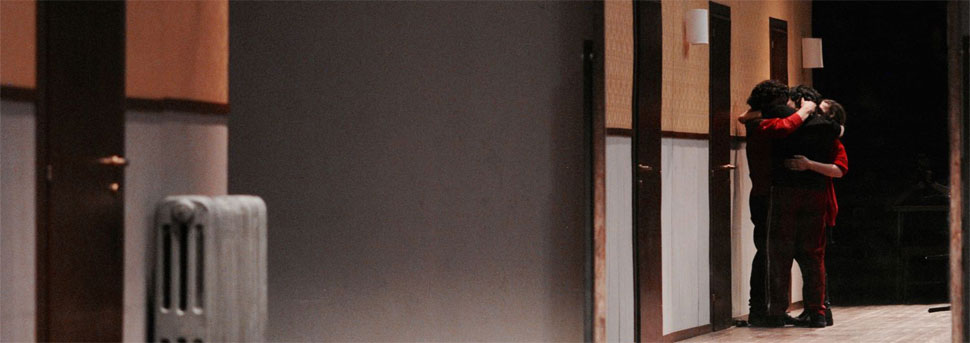from Euripides
adaptation Pablo Solari
tutor Antonio Latella and Federico Bellini
director assistant Pablo Solari
director Antonio Latella
characters and interpreters
Orestes Christian La Rosa
Elettra Marta Cortellazzo Wiel
Pilade Andrea Sorrentino
Helen Barbara Chichiarelli
Ermione Mariasilvia Greco
Choir Mariasilvia Greco and Barbara Mattavelli
Menelaus Ludovico Fedegni
Tindaro Gianpaolo Pasqualino
Messengers Alessandro Bay Rossi and Isacco Venturini
Phrygian servants Alexis Aliosha Massine and Emanuele Turetta
Apollo Gianpaolo Pasqualino
and with Leonardo Lidi, Federica Rosellini, Ilaria Matilde Vigna, Giuliana Vigogna
project playwrights Federico Bellini and Linda Dalisi
production Emilia Romagna Teatro Fondazione
with the support of Fondazione Cassa di Risparmio di Modena
Duration 1h 50′
Played in Italian with English subtitles
in the frame of the project “At the Prospero’s School. Actors in the global net”
![]()
Orestes
ORESTES Power, wealth, there’s nothing like a true friend. You’ve been by my side through thick and thin. And now in vengeance. But this is no time for compliments. I want to spit blood, dying after punishing my enemies and ruining the traitors. Blood. I am the son of Agamemnon, leader of all the Greeks; elected, not a tyrant, a father with the strength of a God. I will not die a slave, I will kill as a free man; I will honor the name of my race. Kill or die.
Accused of matricide and prey to the Furies, the last of the family Atreus is a victim of the weight of history and the inevitability of his crimes. A journey of initiation into maturity and adulthood. Pylades and Electra, faithful and beloved companions, will follow him ravenously and tragically, like a pack of wolves searching to quench the thirst for life.
Eternal son of Agamemnon, he is responsible for the future of his dynasty, the son predestined to crime, matricide, murderer of the hated mother who exiled him, forced to grow up far from Argos because he was too dangerous to the new political regime. But can you ever really hate your mother? What strength is it that pushes the knife into Clytemnestra’s womb? The curse? Responsibility to his father? A hunger for power? What are the consequences? Are freedom and redemption considered crimes in this case? Can redemption even begin to erase the guilt?
Euripides makes a man full of doubts of Orestes, violently forced to lose his innocence in the grip of family curse and ravenous inner Furies. A brother not able to look after his sister; enamored Electra, who waited for him, and who loved her father and who desperately needed Orestes.
Pylades, a friend and companion. He sacrificed his own past, a disowned by his house and traitor to his city, joined with Orestes in the fight till death – death or glory. This is the new order against the old. It is the struggle of children against parents.
Argo and its citizens observe and judge the matricide. It is a dead capital, political prey for demagoguery and populism, a decayed palace, without master or king.
Orestes is neither hero nor king, neither Agamemnon, nor Atreus. Orestes is weakness, fear, confusion, love, passion, life, and light.
But is he ready to become King? a man? Can he even bear to look at himself in the mirror?
Pablo Solari


